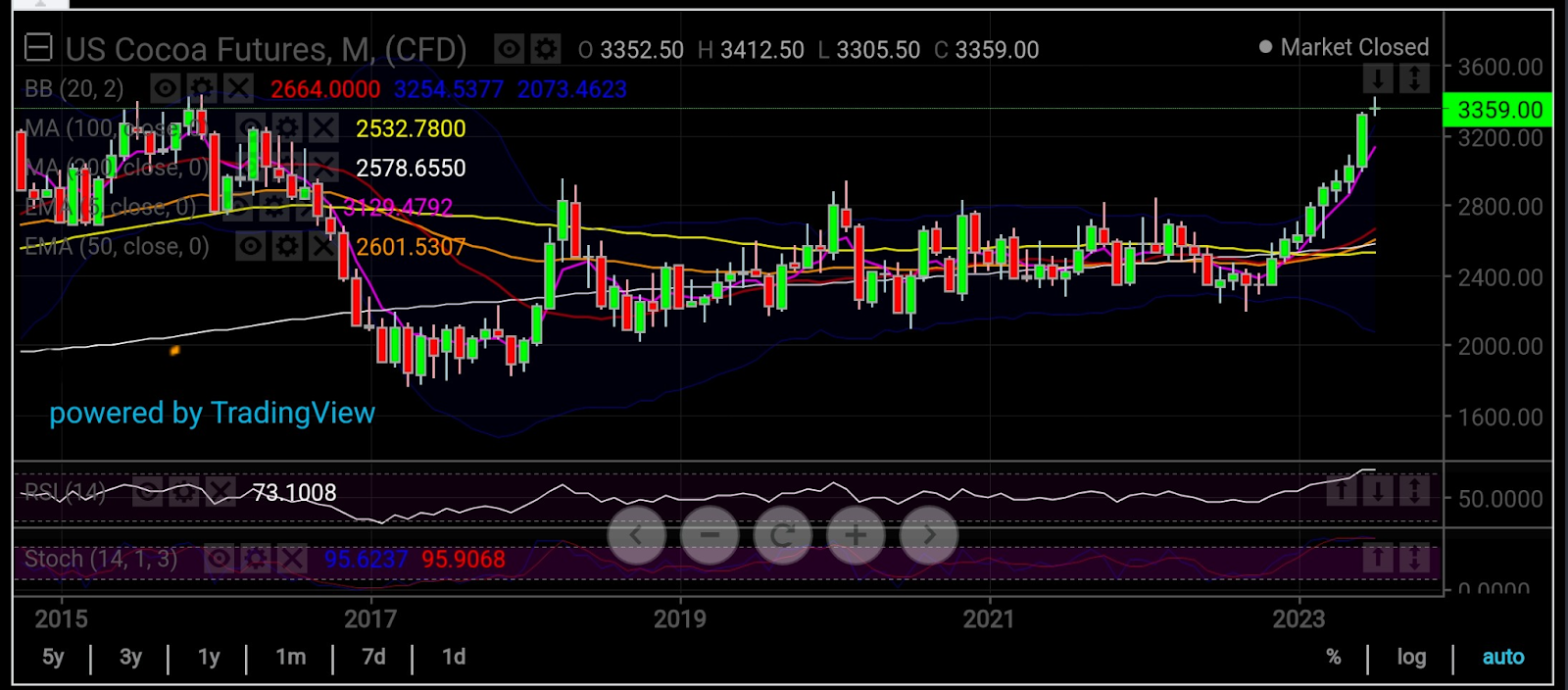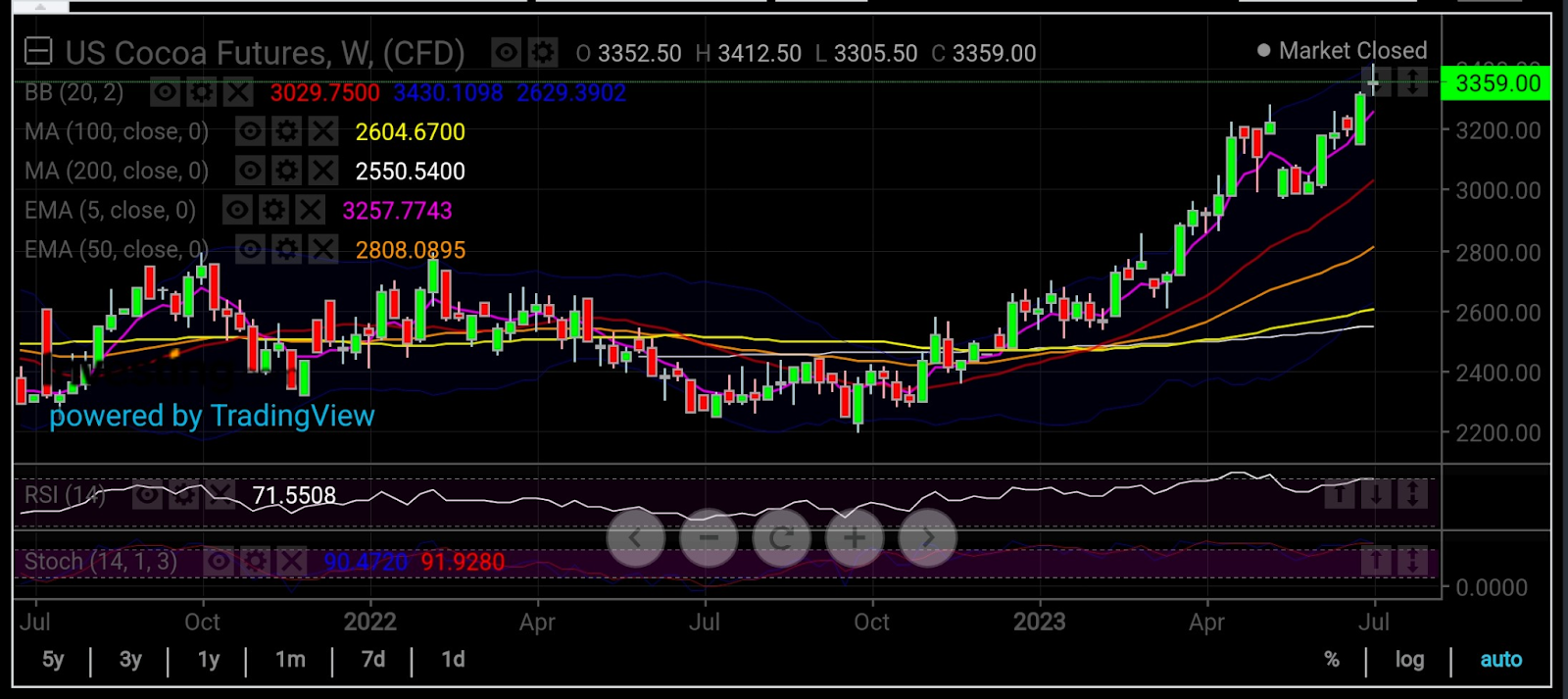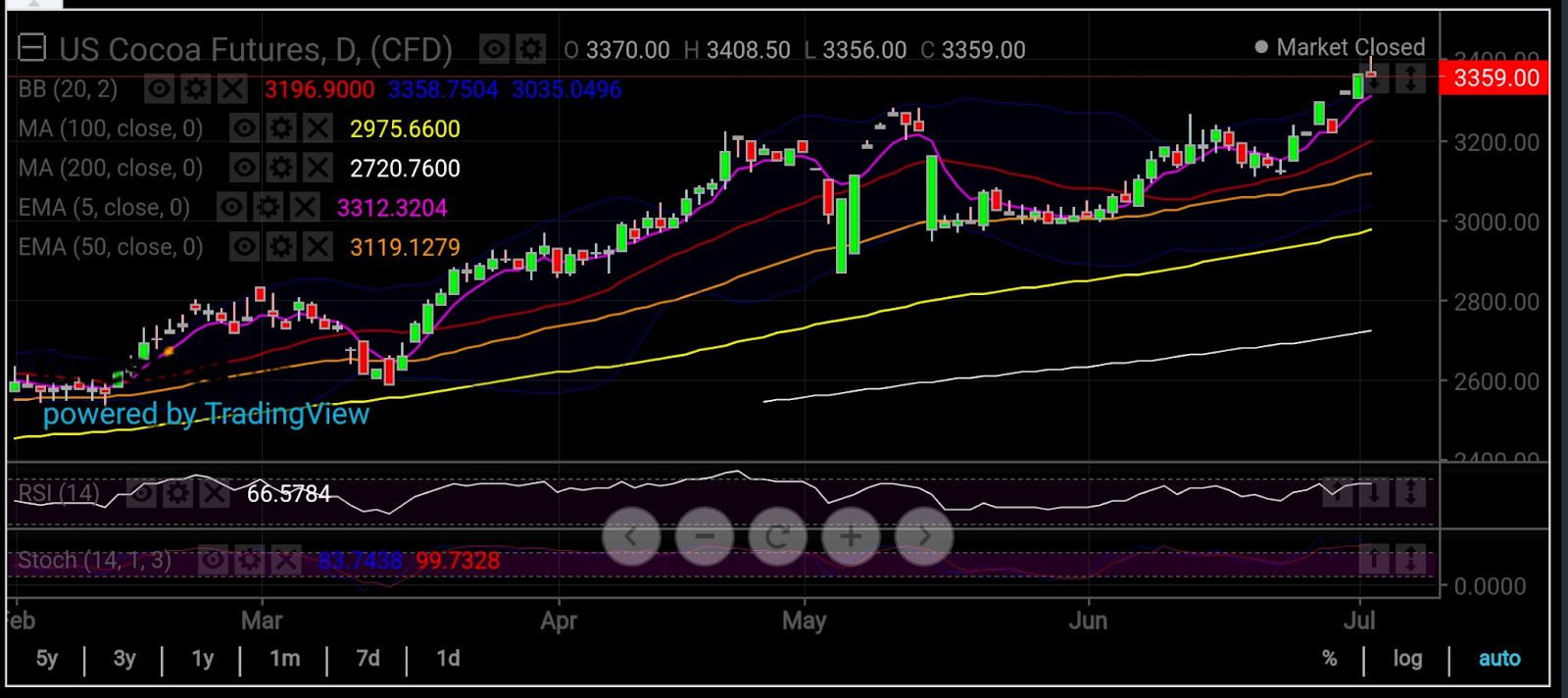Bitcoin price today: dips to $92k as Fed cut doubts spark risk-off mood
- Cocoa prices have experienced a one-year rally and have returned over 40%, with bulls aiming for a more than 12-year high.
- The rally in cocoa is supported by reduced bean arrivals in Ivory Coast and concerns about El Nino weather and black pod disease.
- Technical analysis suggests a possible pullback, but the primary bull trend remains intact.
- Looking for more actionable trade ideas to navigate the current market volatility? InvestingPro Summer Sale is on: Check out our massive discounts on subscription plans!
One of the longest-running fairytales in commodities is still running: After a one-year rally and return of more than 40%, cocoa hasn’t given up yet, with bulls eyeing a more than 12-year high next — if profit-takers can be kept at bay, that is.
Fundamentals for cocoa are as steamy as the hot chocolate beverage it is famed for, with a bean crunch and inclement crop weather in top grower Ivory Coast underpinning the latest run-up in beverage-to-candy commodity.
But sustenance of cocoa’s upside might also depend on chart action.
And this is where cocoa could run into trouble because its rally has run a little too long for it to stay technically supported without a few corrections at least, says Sunil Kumar Dixit of SKCharting.com. He adds:
“The natural course of cocoa now calls for a pull back towards the support areas. What the commodity has going for it, however, is a primary bull trend that is still intact even in the event of profit-taking. This means that whatever happens on the downside will not shake up the market too much.
So, on the flip side, a consolidation could help cocoa bulls regroup at the support areas and press for another up-wave.”
 Charts by SKCharting, with data powered by Investing.com
Charts by SKCharting, with data powered by Investing.com
Fundamentals
The front-month contract in New York-traded cocoa hit 7-½ year highs of 3,412.50 a tonne on July 3 as reduced bean arrivals in Ivory Coast led to fears about worsening supply.
The rally in cocoa has intensified over the past two weeks on concerns about the El Nino weather phenomenon — which warms the Pacific Ocean — and heavy rain in West Africa that has accelerated the spread of black pod disease that causes cocoa pods to turn black and rot.
The U.S. Climate Prediction Center said last month that sea surface temperatures across the equatorial Pacific Ocean had risen 0.5 degrees Celsius above normal, and wind patterns have changed to the point where the El Nino criteria has been met.
The spread of the cocoa pod disease from the extreme wet weather could, meanwhile, result in lower bean quality and production.
Wet conditions in West Africa have also slowed down the mid-crop harvest and truck shipments in the Ivory Coast.
As a result, Ivory Coast farmers have only shipped 2.24 million tonnes of cocoa from Oct 1-July 2, down 2.2% year-on-year. 
Stronger demand for cocoa in a world fully back to pre-pandemic conditions has also backed the year-long rally in the commodity.
- Asian cocoa grinds rose 4.09% year-on-year in the first quarter to 222,028 metric tonnes.
- European grinds rose 0.5% year-on-year to 375,375 tonnes, the highest for a first quarter since 1999.
- North American cocoa grinds in the first quarter, however, fell 4.4% year-on-year to 109,666 tonnes.
The International Cocoa Organization is forecasting a global cocoa deficit of 146,000 tonnes for 2022/23. "The expectation of a supply deficit has been compounded with weather variations, especially in West Africa,” the organization said.
Cocoa is unique in the sense that the higher the quantity of its ground products — i.e. cocoa butter, powder and liquor — in the market, the higher the price of the primary commodity itself. This is different from, say, refined oil products like gasoline and diesel, which would drop in value from a supply glut that would also likely weigh on the crude oil price itself.
Chocolate, ice cream, baked goods and cocoa beverages are luxury and festive products that typically see high demand during good economic times — and weak consumer appetite when things aren’t going so well.
Cocoa fell 19% in March 2020 during the first global outbreak of COVID-19. But it managed to end that year almost flat on the back of the global economic recovery from the pandemic. In 2021, it rose just over 3% while in 2022, it gained 2%.
Technicals & Outlook
If cocoa’s upward momentum continues, the next target it will seek after this week’s $3,412.50 peak will be the November 2015 high of nearly $3,430.
If it gets beyond that 7-½ year high, the next aim of cocoa bulls will be the March 2011 peak of $3,826, which would mark a 12-½ year high.
So far, cocoa has only had one negative month in the past thirteen — September, when it slid 3%. Otherwise, it has gone from July last year to this July with 12 months in the green, accumulating a gross gain of 41.5%.
In absolute price terms, it went from an opening of $2,340 in July 2022 to the latest settlement of around $3,358.
Says Dixit of SKCharting:
“Cocoa’s long term monthly chart shows a strong uptrend which may be near completion at this stage and a window of possible correction for momentum distribution may be wide open before embarking on further upside.
As Stochastics and Relative Strength Index reach overbought territories across the daily, weekly and monthly time frames, the market’s reflex would be a pullback.”
Dixit said a retest of the 5 Day EMA, or Exponential Moving Average, of $3,312, followed by the 5-week EMA of $3,257 may be the initial signs of a correction that could extend to the Daily Middle Bollinger Band of $3,196 and the 50-day EMA of $3,120 as well as the Weekly Middle Bollinger Band of $3,030.
Adds Dixit:
“Since the primary uptrend remains intact, buyers are likely to resurface on the test of support areas.
A strong breakout above the November 2015 high of $3,429 will set stage for further advances toward the next leg higher, which will be the 2011 peak of nearly $3,830. Expect several twists and turns before it gets there, for sure.”
***
With InvestingPro, you can conveniently access a single-page view of complete and comprehensive information about different companies all in one place, eliminating the need to gather data from multiple sources and saving you time and effort.
As part of the InvestingPro Summer Sale, you can now enjoy incredible discounts on our subscription plans for a limited time:
- Monthly: Save 20% and gain the flexibility to invest on a month-to-month basis.
- Yearly: Save a jaw-dropping 50% and secure your financial future with a full year of InvestingPro at an unbeatable price.
- Bi-Yearly: Save an astonishing 52% and maximize your returns with our exclusive web offer.
Don't miss out on this limited-time opportunity to access cutting-edge tools, real-time market analysis, and expert insights. Join InvestingPro today and unlock your investing potential. Hurry, Summer Sale won't last forever!
Disclaimer: The content of this article is purely to educate and inform and does not in any way represent an inducement or recommendation to buy or sell any commodity or its related securities. The author Barani Krishnan does not hold a position in the commodities and securities he writes about. He typically uses a range of views outside his own to bring diversity to his analysis of any market. For neutrality, he sometimes presents contrarian views and market variables.

